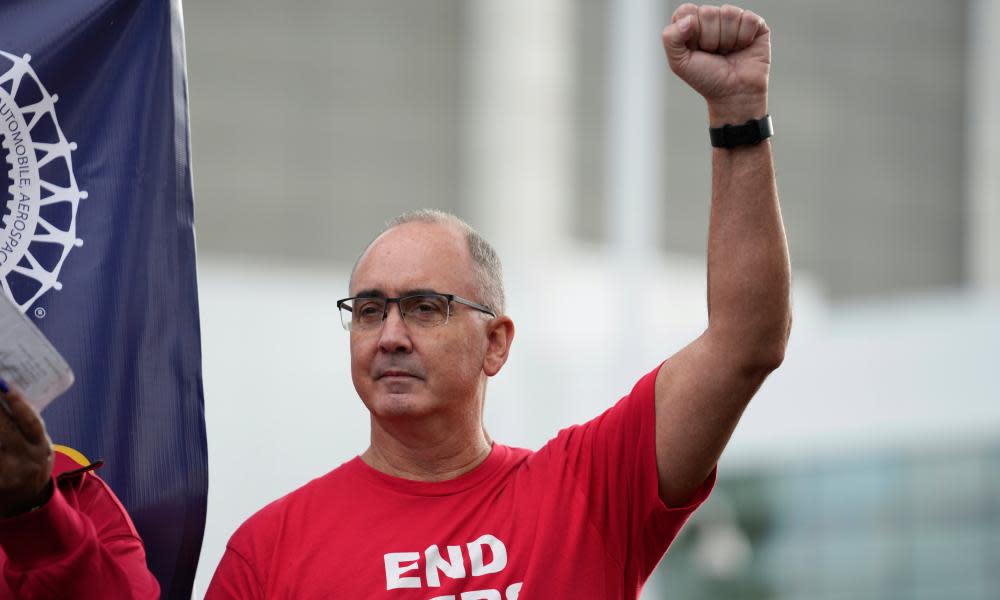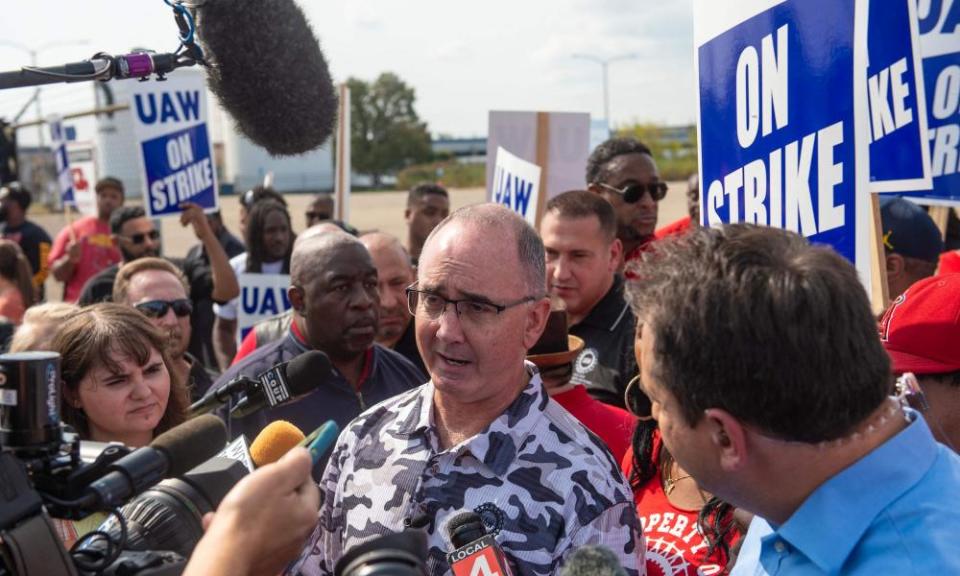The UAW leader fighting to defend autoworkers from ‘corporate greed’

Shawn Fain isn’t messing around. Just six months into his job as president of the United Auto Workers (UAW), he is leading US car workers in their biggest strike in a generation and on Tuesday secured a historic first: getting a sitting US president to join the pickets.
The 54-year-old is the grandson of two UAW retirees and won the union’s presidency in a close-fought election in March. From the get-go he has taken an aggressive, uncompromising stance as the UAW has negotiated new contracts with Detroit’s big three automakers.
Related: Joe Biden’s visit to the UAW picket line is historic – and may pay off politically
Before his election, the UAW was rife with corruption. Senior figures, including the former president Gary Jones, were jailed for embezzlement. The scandal led to the UAW’s first-ever election by direct vote rather than by a convention of delegates. Fain won on a promise of internal reform and external action.
“This is our shot for true reform of the UAW, to put the power and control of our union back in the hands of the membership by electing leaders who will be held accountable by the membership,” his campaign page said.
Born and raised in Kokomo, Indiana, he got his start working at a Chrysler plant as an electrician in 1994. He served in local union roles before serving for 10 years as a UAW international representative, a role in which he spoke out against concessions made by the union during the 2008 economic recession. “You might as well get a gun and shoot yourself in the head,” he wrote in a letter to the UAW at the time.
His anger at that deal has not abated. In August, when Stellantis (as Chrysler is now known) made one of its first contract offers to the UAW, Fain threw it in the trash on a Facebook live feed. “That’s where it belongs – in the trash – because that’s what it is,” he said.
Fain also refused the usual handshake with the big three’s CEOs that has been the traditional start of contract negotiations for decades. “There’s no point in having a big pomp and ceremony where we act like we’re friends, and we’re working together, when we’re not,” said Fain. “The membership comes first. That’s our job.”
Fain has clearly outlined the grievances of union membership with the automakers. Concessions made in previous contracts since the 2008 economic recession have to go, he has said.

“I want to work with the companies. I want to have a good relationship,” Fain said. “But if they’re not going to treat our members with respect and not give them their due, then we’re going to have issues.”
The UAW boss has effectively contrasted those concessions with the record profits and soaring pay enjoyed by the car companies and their executives.
The big three US automakers have showered shareholders with nearly $85bn in dividends and stock buybacks since the 2008 economic recession and auto bailouts, while autoworker wages have fallen with inflation taken into account.
The automakers have come out of the Covid-19 pandemic with record profits, with combined totals of over $70bn in 2021 and 2022.
“They pretend that the sky will fall if we get our fair share of a quarter of a trillion dollars the big three has made over the past decade,” said Fain in a recent video released by the UAW titled Corporate Greed. “One of our workers would have to work 400 years to make what a CEO makes in one year.”
Related: It’s fantastic that Biden is joining the UAW picket line. But he should go further
But while his rhetoric has been head-on, his tactics have been more subtle and owe more to Sun Tzu’s The Art of War. Fain surprised the automakers in announcing a “stand up” strike strategy in which local unions would be called up to strike by the UAW as the majority of the workforce would continue reporting to work.
The tactic left the automakers guessing incorrectly where strikes would first begin while conserving the UAW’s strike fund to pay its members. It is also the first time in the UAW’s history that the union is on strike at all three automakers. Following some movement in negotiations with Ford, Fain expanded the strike last week to 38 parts and distribution sites across 20 states at GM and Stellantis.
His strategy and rhetoric, aimed broadly at wealth inequality and corporate greed, has garnered comparisons to Walter Reuther, who served as president of the UAW from 1946 to 1970 and oversaw an aggressive expansion of the labor movement in the 1950s and 60s.
But perhaps the most unusual outcome of Fain’s campaign so far has been its impact on Washington. Joe Biden joins the picket line on Thursday – a historic first for a sitting president. His most likely 2024 rival, Donald Trump, will address autoworkers in Michigan on Thursday, though the UAW has strongly criticized Trump. Polling suggests both candidates are right to back the workers – 58% of Americans support the strike with 32% against, according to a Reuters/Ipsos poll.
“The corporate media is scared. The billionaire class is scared and the big three is scared,” said Fain in a video posted on the UAW’s latest live stream last week. “They want to make you think you don’t deserve your fair share. They want you to be afraid because they’re afraid. They’re afraid because they see their system, where the billionaires keep everything, crumbling. The world is watching and the people are on our side.”

